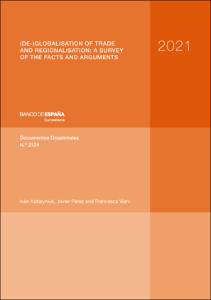(De-)Globalisation of trade and regionalisation: a survey of the facts and arguments
Authors
Issue Date
21-Oct-2021
Physical description
35 p.
Abstract
La pandemia de COVID-19 provocó algunas distorsiones en el comercio internacional, la mayoría de carácter temporal, ya que los flujos comerciales internacionales de bienes recuperaron sus niveles previos a la pandemia a finales de 2020. En todo caso, los factores geopolíticos están ganando terreno en la configuración del comercio transfronterizo, puesto que muchos países adoptaron iniciativas destinadas a influir en la deslocalización de la actividad de sus empresas internacionales y en la reorganización de las cadenas globales de valor. Estas medidas recientes pueden verse como parte de un proceso previo, a mayor escala, que cuestiona el marco multilateral basado en la Organización Mundial del Comercio. Otro proceso en curso antes del estallido de la pandemia fue la desaceleración del comercio internacional de mercancías. Todos estos elementos han estimulado un debate sobre la dirección en la que podrían evolucionar el comercio internacional y la globalización. En este documento proporcionamos una revisión de los principales argumentos presentados en la literatura y los hechos estilizados necesarios para enmarcarla.
The COVID-19 pandemic initially caused some international trade distortions, most of which were temporary, since international goods trade flows recovered their pre-pandemic levels by the end of 2020. Against this background, geopolitical factors are gaining traction in shaping cross-border trade, as many countries adopted initiatives geared to influencing the relocation of their international firms’ activity and the reorganisation of global value chains. These recent measures, though, can be seen as part of a larger-scale pre-pandemic process that partly called into question the WTO rules-based multilateral framework. Another process under way prior to the outbreak of the pandemic was the slowdown in international trade in goods. All these elements have spurred an active debate on the direction international trade might take and have called into question the future of globalisation. In this paper we provide a survey of the main arguments put forward in this literature and the key stylised facts needed to frame it.
The COVID-19 pandemic initially caused some international trade distortions, most of which were temporary, since international goods trade flows recovered their pre-pandemic levels by the end of 2020. Against this background, geopolitical factors are gaining traction in shaping cross-border trade, as many countries adopted initiatives geared to influencing the relocation of their international firms’ activity and the reorganisation of global value chains. These recent measures, though, can be seen as part of a larger-scale pre-pandemic process that partly called into question the WTO rules-based multilateral framework. Another process under way prior to the outbreak of the pandemic was the slowdown in international trade in goods. All these elements have spurred an active debate on the direction international trade might take and have called into question the future of globalisation. In this paper we provide a survey of the main arguments put forward in this literature and the key stylised facts needed to frame it.
Publish on
Documentos Ocasionales / Banco de España, 2124
Subjects
Globalización; Política comercial; Globalization; Trade policy; Cooperación e integración económicas; Economía internacional
Appears in Collections:












